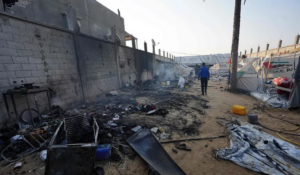Arabs & Palestinians decry inaction over Israeli targeting of Hamas commander in ‘safe’ zone

The displaced persons’ camp that was hit in al-Mawasi on 13 July 2024
Nagham Zbeedat reports in Haaretz on 15 July 2024:
Weeks into the war in Gaza, the Israeli army designated the area of Al-Mawasi a humanitarian safe zone, instructing Gazans to evacuate there. Soon, the 16 square-kilometer strip along southern Gaza’s coast became the only safe area for over 380,000 displaced Palestinians.
Nine months into the war, the Israeli army launched a military attack on Al-Mawasi, killing at least 90 Palestinians and injuring 300 others, including, according to the IDF, the commander of Hamas’ Khan Yunis Brigade, Rafa’a Salameh.
The Israeli army stated that the other target of Saturday’s attack was Hamas’ military wing commander Mohammed Deif, a mastermind of the October 7 massacres, but Prime Minister Benjamin Netanyahu admitted that there is “no certainty” that Deif was killed. Hamas says Israel’s claim that it targeted its leadership was “false,” asserting that it was “aimed at covering up Israel’s crimes” of targeting civilians.
Following news of the attack – not the first to take place at an area designated by the IDF as a “safe zone” – Arab and Palestinian voices, both on social media and on the ground, were quick to speak out.
On Saturday, a large crowd gathered at the entrance to the Arab city of Umm Al-Fahm in northern Israel to protest the ongoing war and the attack on Al-Mawasi. Responding to a call from the local committee, the demonstrators used written slogans and chants to demand an end to the “abuse of Palestinian prisoners” and the “killing of women and innocent children.”
Speaking at the rally, Sheikh Ra’ad Salah, the former head of the now-outlawed northern branch of Israel’s Islamic Movement, told online Arabic media outlet Bokra News that Israeli Palestinians feel they must protest as they “watch the humanitarian crisis in Gaza become increasingly insufferable.” Khaled Mahajneh, the first lawyer to visit Israel’s Sde Teiman detention facility, said the protesters gathered to “show solidarity with our people in the Gaza Strip,” and stressed that Palestinians in Israel and Gaza “are one people and our struggle is united.”
In an interview with Al-Jazeera Egypt, political commentator Ehab Jabareen, a resident of Umm al-Fahm, said that following the attack on Al-Mawasi, “Israel no longer cares about the international level.” He added that Israel “justifies its killing of dozens … as ‘collateral damage,’ as it always does. There are voices within Israel saying that what was truly assassinated in this massacre is the ceasefire deal.”
Resentment towards international governments’ lack of efforts to stop the war, especially Arab governments, is a theme among many social media posts concerning the attack.
Dr. Nayef Nahar Al-Shammari, a Qatari author and researcher, accused the Western world of hypocrisy, sharing footage from the aftermath of the strike and highlighting the contrasting treatment of Gazan and Afghan women. “The West that supports Israel in its open extermination of Gazan women is the same West that threatens Afghanistan with cutting off aid if it does not allow Afghan women to receive higher education,” he wrote.
Ahmed Hijazi, a Palestinian who fled Gaza after his wife gave birth to their firstborn, asked in one of many posts decrying the mounting death toll in Gaza and the world’s inaction in the face of it, “Why has Gaza become dispensable to everyone?” In another post, Hijazi said the attack “was an assassination of more than 100 unarmed Palestinian civilians who took refuge in this area after being forcibly displaced over ten times … an assassination of civilian martyrs, whose daily thoughts were focused on saving water, finding means of daily survival, or seeking shelter from the summer heat under the shade of a tree.”
Tamim Al-Barghouti, a Palestinian-Egyptian poet, columnist and political scientist, took to X to accuse rulers and governments of “treachery” and “cowardice,” saying that the people remain in “despair because our anger was in vain.”
This article is reproduced in its entirety
